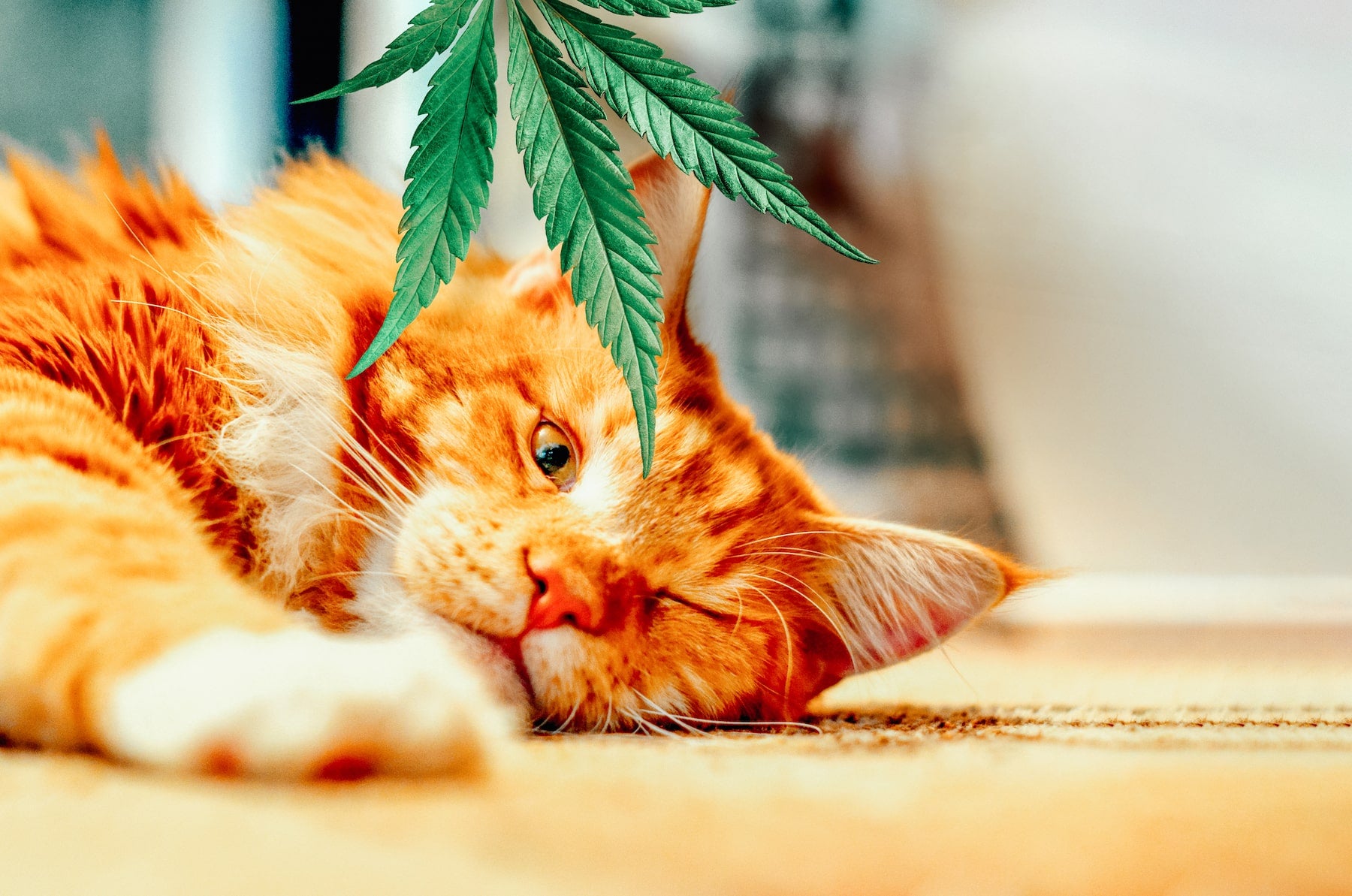
Many people in the dog world have been using CBD for years. But what about cats? This article will help you learn more about CBD oil for cats so that you can make informed decisions for your feline friend.
Here are the most frequently asked questions cat owners often ask about CBD oil. Click the link below to jump to the answers you are most interested in learning about:
What is CBD?
How does CBD work?
Are CBD oil and hemp oil the same thing?
What does full-spectrum mean and is it good for my cat?
Is CBD oil safe for cats?
Do I need a prescription to give CBD oil to my cat?
How much CBD oil is right for my cat?
What if my vet won’t talk to me about CBD?
How do I make sure to get a high-quality CBD oil for my cat?
Is there any scientific research on CBD oil?
What is CBD?
CBD is short for cannabidiol, one of the many cannabinoids found in plants from the cannabis family.
As one of the two most-researched compounds found in hemp, cannabidiol has been the subject of hundreds of research studies over the last three decades. These studies include medical research on anxiety, inflammation, pain, sleep, appetite, mood, metabolism, a wide variety of skin problems, immunity, gut health, and more.
Unlike THC, the compound found in marijuana that creates the psychological effect known as a “high,” CBD is not psychoactive. And, because the hemp strains of cannabis plants are legally required to have less than .3% of THC, CBD oil made from hemp is safe for pets, including cats.

How Does CBD Work?
CBD and the other natural compounds found in hemp interact with the body’s Endocannabinoid System (ECS). This system was discovered in the 1980s, and scientists have learned that the ECS acts as a regulator for balance or “homeostasis” in a variety of bodily functions.
The ECS works with the central and peripheral nervous systems to regulate processes including pain, inflammation, appetite, mood, memory, the immune system, digestion, sleep, skin health, and more.
It’s important to understand that the ECS includes special receptors, transmitters, as well as chemicals called endocannabinoids which are produced by the body itself.
Evolutionary scientists have argued that the Endocannabinoid System and the diets of early hunter-gatherers may have coevolved. They suggest that adding cannabinoids back into the diet may help mitigate some of the issues caused by modern diets packed with processed grains and carbohydrates.
And yes, your cat has an endocannabinoid system. In fact, all mammals on the planet have one!

Are CBD Oil and Hemp Oil The Same Thing?
This is one of the most commonly asked questions from cat owners. The answer is a little bit complicated because the hemp and CBD industries are rapidly evolving right now.
The short answer is that in many cases, hemp oil and CBD oil can refer to the same thing. In some cases, however, they don’t. That’s why it’s important to dig a little deeper and learn more about the quality of the product you’re purchasing for your pet.
Most hemp and CBD oils are made by refining the hemp plant. Both usually contain the compound CBD. However, given that CBD is the active ingredient in such oils, you should only purchase products that have the CBD dosage clearly labeled, from companies backed up by third-party lab tests.
On the other hand, beware of hemp seed oil for cats. Although it may be a healthy supplement for some cats, it does not contain appreciable amounts of the compound CBD since it is made from the seeds of the hemp plant. Many manufacturers on the market are misleading on this issue, so buyer beware!
What Does “Full-Spectrum Mean and Is It Good for My Cat?
If the products are labeled as “full-spectrum” they also have trace amounts of other cannabinoids found in the hemp plant.
Many believe that full-spectrum oils are more effective because trace amounts of additional flavonoids, terpenes, and cannabinoids found in these oils have a synergistic effect in healing processes, known by scientists as "The Entourage Effect."
For example, Lolahemp’s CBD tinctures, topicals, and chews are all made using full-spectrum organic hemp oil that is slowly processed using low temperature and pressure, producing a robust full-spectrum CBD oil for your cat. See our batch lab results to learn more.
Is CBD Oil Safe for Cats?
Vets and pet owners alike have found that CBD is safe for cats. However, it’s worth mentioning that there have been no large-scale studies done on CBD for cats, and no CBD-based drugs have been approved by the FDA for the treatment of cat disorders or diseases.
We recommend that you work with your vet or consult with a holistic vet to make sure you give your cat CBD oil safely.
Does My Cat Need a CBD Oil Prescription?
No.
CBD oil and hemp oil are now available for pets without a prescription. However, we recommend that you discuss using CBD oil for cats (as well as side effects from traditional medications) with your vet to determine appropriate dosing for his or her case as well as to avoid any potential drug interactions.
In addition, please be sure to do your research to make sure you are getting high-quality CBD products made to be safe for cats.

What’s The Right Dosage?
Again, we recommend working with your vet to work out a dose that is best for your cat’s condition. However, as a general guideline, you can start at 1mg per 10lbs of cat weight, twice daily.
Since different CBD products on the market can have very different concentrations of CBD, you need to be careful about the dose in the actual product you use.
For example, with Lolahemp tinctures, 2 drops = 1 mg of CBD. Note that this dropper guideline will not be the same with other brands so be careful when calculating dosing.
The general rule when using any hemp products is to start low and increase the dosage slowly until the desired effects are achieved. If you notice any side effects such as nausea, drooling, excess tiredness, or tremors of any kind, it is wise to stop giving CBD to your cat and consult with your vet.
What if My Vet Won’t Talk to Me About CBD?
Up until just recently, hemp-based products had a questionable legal standing. However, the 2018 Farm Bill made hemp and hemp products legal in the U.S.
Further complicating matters is the fact that many veterinarians are restricted from discussing CBD with their clients due to restrictive or unclear state veterinary licensing requirements.
Some veterinarians, such as those in California, have even had to resort to legislative action to gain protection when discussing the potential therapeutic values of cannabis-based medicine with their clients.
If your vet is unwilling to discuss using CBD for your cat, you may want to consult with a holistic veterinarian. These vets have additional training that includes the use of natural products, known as nutraceuticals, in their clinical practices. Because these vets are often more experienced in the use of CBD with pets, they can be a better resource for informed cat owners.

How Do I Make Sure I’m Using High-Quality CBD Oil?
One of the most important things you can do to help your cat is to do your research before buying any CBD or hemp product for them.
The reason for this is that the demand for CBD pet products is exploding right now as word of mouth spreads. And, unfortunately, some companies are taking advantage of that by selling low-quality or even harmful products.
Here at Lolahemp, quality is our number one priority. Here are some of the key features that make Lolahemp CBD the right choice for your cat:
- We start with hand-harvested organic hemp grown at a family farm in Colorado.
- We test our products three times from seed to bottle.
- We offer third-party lab testing for every single batch of our oil, tied to a QR code on every product we sell.
- We offer a robust full-spectrum CBD oil made just for pets.
- Our products contain no harmful additives like artificial flavors or sweeteners that can be toxic to pets.
- We include accurate and veterinarian-recommended dosing guidelines for our products.
- We use MCT coconut oil for our carrier oils, considered ideal for optimal cannabinoid absorption.
- We are a Pets Before Profits company with a strong commitment to animal welfare.
Is There Any Scientific Research on CBD Oil?
It is no surprise that veterinary medical research is often several years behind the human-based iterations of various supplements and drugs. However, research on CBD and hemp has been going on for decades.
Below, you can find a list of links to helpful research studies on CBD. Each link goes to a primary scientific paper published in peer-reviewed scientific journals.
Want to Learn More About CBD for Cats?
We hope this guide to CBD for cats has answered all of your questions. We invite you to learn more about CBD through our educational blog. In addition, to hear from some of our verified customers about their success using Lolahemp CBD oil for cats, please visit our customer review page.
References:
https://lolahemp.com/pages/lab-tests
https://www.sciencedirect.com/science/article/abs/pii/S0165614716300165
https://portlandpress.com/essaysbiochem/article-abstract/64/3/485/225762/The-endocannabinoid-system
https://www.mdpi.com/1422-0067/19/3/833
https://bpspubs.onlinelibrary.wiley.com/doi/full/10.1111/bph.13676
https://lolahemp.com/pages/lab-tests
https://lolahemp.com/collections/topicals
https://lolahemp.com/collections/chews
https://lolahemp.com/pages/raw-oil-test
https://lolahemp.com/blogs/news/cbd-oil-for-dogs-potential-drug-interactions
https://lolahemp.com/collections/tinctures
https://www.veterinarypracticenews.com/cannabis-debate-giving-veterinarians-a-voice/
https://news.vin.com/default.aspx?pid=210&Id=8700040&useobjecttypeid=10&fromVINNEWSASPX=1
https://lolahemp.com/pages/lab-tests
https://lolahemp.com/blogs/all
https://lolahemp.com/pages/reviews
https://www.liebertpub.com/doi/full/10.1089/can.2019.0052
https://www.ncbi.nlm.nih.gov/pmc/articles/PMC5121237/
https://www.ncbi.nlm.nih.gov/pmc/articles/PMC6856203/
https://journals.lww.com/behaviouralpharm/Citation/2020/09000/Cannabidiol_disrupts_conditioned_fear_expression.9.aspx
https://www.sciencedirect.com/science/article/abs/pii/S0091305718306464
https://www.ncbi.nlm.nih.gov/pmc/articles/PMC5690292/
https://pubmed.ncbi.nlm.nih.gov/30083539/
https://www.pnas.org/doi/abs/10.1073/pnas.160105897
https://link.springer.com/chapter/10.1007/978-3-319-20825-1_15
https://bpspubs.onlinelibrary.wiley.com/doi/full/10.1038/bjp.2008.177
https://www.ncbi.nlm.nih.gov/pmc/articles/PMC3232190/
https://academic.oup.com/ibdjournal/article/25/6/1006/5341970?login=true
https://pubs.acs.org/doi/abs/10.1021/tx9800598
https://www.sciencedirect.com/science/article/pii/S0925443920301162
https://faseb.onlinelibrary.wiley.com/doi/abs/10.1096/fasebj.2020.34.s1.04622
https://www.frontiersin.org/articles/10.3389/fpls.2018.01969/full
https://www.ingentaconnect.com/contentone/ben/cn/2020/00000018/00000002/art00004
https://www.sciencedirect.com/science/article/abs/pii/S0968089615000838
https://www.ncbi.nlm.nih.gov/pmc/articles/PMC5685274/
https://www.sciencedirect.com/science/article/pii/S0925443920301162
https://www.ncbi.nlm.nih.gov/pmc/articles/PMC3232190/
https://pubmed.ncbi.nlm.nih.gov/18502582/
https://journals.lww.com/neuroreport/Abstract/2002/04160/Cannabidiol,_a_non_psychoactive_component_of.6.aspx
https://bpspubs.onlinelibrary.wiley.com/doi/full/10.1111/j.1476-5381.2011.01621.x
https://www.ncbi.nlm.nih.gov/pmc/articles/PMC5685274/
https://pubmed.ncbi.nlm.nih.gov/18502582/
https://www.ncbi.nlm.nih.gov/pmc/articles/PMC5690292/
https://www.ncbi.nlm.nih.gov/pmc/articles/PMC6319597/
https://www.frontiersin.org/articles/10.3389/fphar.2017.00391/full
https://www.ingentaconnect.com/content/cvma/cjvr/2018/00000082/00000003/art00002
https://www.vetsmall.theclinics.com/article/S0195-5616(18)30087-1/fulltext
https://www.ncbi.nlm.nih.gov/pmc/articles/PMC7092763/
https://avmajournals.avma.org/view/journals/javma/254/11/javma.254.11.1301.xml
https://onlinelibrary.wiley.com/doi/full/10.1111/epi.12631
https://www.nejm.org/doi/full/10.1056/nejmoa1611618
https://www.sciencedirect.com/science/article/pii/S105913111200057X
https://jpet.aspetjournals.org/content/365/3/652
http://real.mtak.hu/83626/
https://pubmed.ncbi.nlm.nih.gov/30138623/
https://www.ncbi.nlm.nih.gov/pmc/articles/PMC2757311/

